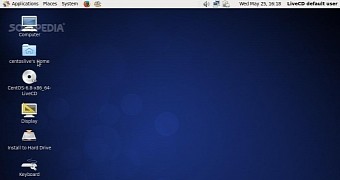The CentOS team announced the official availability of the CentOS Linux 6.10 operating system as the latest update to the CentOS 6.x series.
Based on Red Hat Enterprise Linux 6.10, CentOS Linux 6.10 incorporates a new GCC (GNU Compiler Collection) update that supports retpolines to better protect users against the second variant of the well-known Spectre security vulnerability affecting billions of computers powered by modern processors.
The CentOS Linux 6.10 release also rebases the gcc-libraries, clufter, and pacemaker packages on newer upstream releases, updates the iptables-services package to read configuration files from the /etc/sysctl.d folder, and updates BIND with a new root KSK for the forthcoming DNSSEC Root Zone Key-Signing-Key rollover.
"CentOS Linux 6.10 is derived from source code released by Red Hat, Inc. for Red Hat Enterprise Linux 6.10. All upstream variants have been placed into one combined repository to make it easier for end users. Workstation, server, and minimal installs can all be done from our combined repository. All of our testing is only done against this combined distribution," said Rich Bowen.
Deprecated device drivers and packages
Additionally, it deprecates several hardware drivers, including 3w-9xxx, 3w-sas, 3w-xxxx, aic7xxx, i2o, ips, megaraid_mbox, mptbase, mptctl, mptfc, mptlan, mptsas, mptscsih, mptspi, qla3xxx, and sym53c8xx, which will no longer receive updates, as well as a few controllers from the megaraid_sas and be2iscsi drivers.
Furthermore, CentOS Linux 6.10 ships without the python-qmf, python-qpid, qpid-cpp, qpid-qmf, qpid-tests, qpid-tools, ruby-qpid, and saslwrapper packages, and also removes TLS compression support from the NSS package to prevent security risks. Read the full release notes for more details, including known issues.
You can download CentOS Linux 6.10 right now for new installations on either 64-bit or 32-bit computers. Existing CentOS Linux 6.9 users can now upgrade their installations to version 6.10 using the built-in updater or by running the "yum update" command in a terminal emulator or the virtual console.

 14 DAY TRIAL //
14 DAY TRIAL //